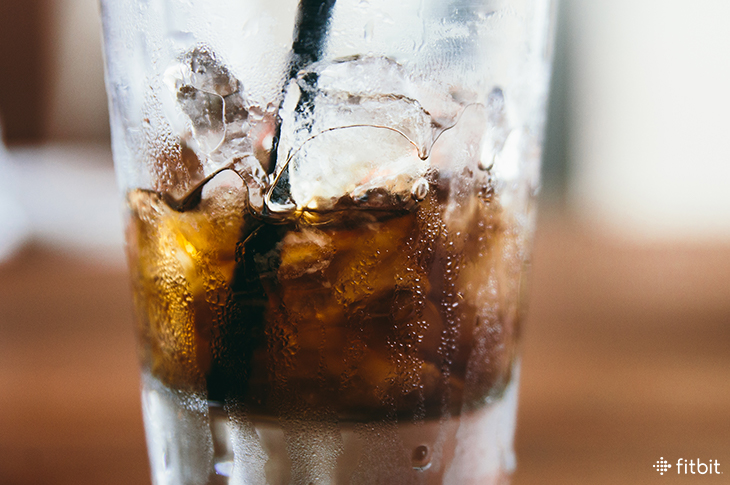
Science has left little doubt: All that sugar swirling around in sweet drinks isn’t good for your health. If you’re trying to give up regular soda, making the switch to diet soda can seem like a sensible swap, to satisfy your sweet tooth without the excess calories. But when diet soda becomes a die-hard habit—when you’re popping it with every meal, using it to get through the afternoon slump at the office, or to wake up before breakfast—you have to ask, is that cocktail of chemicals and fake sweeteners really supporting your health? Learn the facts about fizzy drinks, so you can make a smart choice before you sip.
Can Diet Soda Help You Lose Weight?
Well, if you currently swig multiple cans of sugary soda a day, switching to diet will lower your calorie intake, which could lead to weight loss. Studies funded by the beverage industry even go so far as to claim diet drinks are superior to water, but that data should be taken with a pinch of sugar. A recent study looking at overweight and obese women with type 2 diabetes compared those who switched their diet soda for water to those who maintained their diet soda habit. The water drinkers lost more weight, and had greater improvements in their blood sugar levels and insulin sensitivity, too. So while diet soda is a better choice than regular soda, it’s definitely not a better choice than water. And of course, the rest of your meal matters, as well. If you’re drinking that diet soda with a cheeseburger and fries, or using it as an excuse to eat more cookies later, those calories are coming right back at you.
Are Aspartame and Other Artificial Sweeteners Safe to Drink?
Aspartame, the most common artificial sweetener in drinks, has been blamed for many scary health issues, including cancer. But aspartame is one of the most thoroughly tested and studied food additives in the world. 90 countries agree it’s safe for human consumption, and the FDA says it’s acceptable to drink 50 mg per kg of bodyweight per day. To put that number into perspective: An adult weighing 165 pounds would have to drink about 19 cans of diet soda a day to go over the acceptable level. If you still have concerns, companies are developing drinks using other sweeteners, like stevia (derived from a plant) and sucralose (derived from sucrose; Splenda is a popular brand name), touting them as “more natural.” But although they may be “derived from natural substances,” these sweeteners are still highly processed.
Still, safe doesn’t always equal healthy. Researchers continue to evaluate whether or not aspartame messes with your appetite, as studies have been inconclusive. There have been recent concerns that artificial sweeteners aren’t great for your gut, as they affect the good bacteria and may lead to glucose intolerance in some people. The acids in carbonated drinks can also erode tooth enamel, and diet drinks may be worse for your smile than sugary drinks. And diet colas generally contain a specific acid called phosphoric acid, which has been linked to lower bone density and kidney disease. Questionable appetite, compromised gut bacteria, brittle teeth and bones, and a higher chance of kidney stones—still want to fill your glass with diet soda?
The Verdict
Healthy eating is about focusing on real foods first, ones that provides essential nutrients. Because diet soda doesn’t grow on trees, come from the ground, or roam meadows, it probably shouldn’t be your go-to drink. Add to that, the impact diet soda has on the planet when you consider the bottles, cans, and cups used to consume it, or the water needed to produce it. However, if you’re trying to quit regular soda, and you’re using the diet kind as a stepping stone toward healthier habits, it’s not the worst idea. Or if you’re looking for an alcohol- and calorie-free beverage to avoid being empty-handed at the bar, diet soda can be useful. The occasional diet drink isn’t going to dramatically affect your health—just stick to no more than 1 or 2 servings a day (sipped through a straw to protect your teeth), with the long-term goal of making water your drink of choice.
This information is for educational purposes only and is not intended as a substitute for medical diagnosis or treatment. You should not use this information to diagnose or treat a health problem or condition. Always check with your doctor before changing your diet, altering your sleep habits, taking supplements, or starting a new fitness routine.

As someone who is conscientious about pop intake diet or otherwise, sometimes plain water gets boring. May I recommend carbonated flavored water, my favorite being lemon/lime. No fat, no calories plus tastes good.
there’s also zero-calorie flavorings you can try as well.
Good suggestion.
Wow! This totally changed my decision I am totally going back to water! Thanks FitBit!
Would diet iced tea be considered the same as diet soda?
Limit intake of Diet Sodas to one or two a day? Through a straw to protect teeth? Wow! The writer of this article is encouraging “moderate” use of a neurotoxic substance. It’s like telling a cigarette addict to limit exposure to several cigarettes a day, but the end goal is abstinence! Exposure to neurotoxins (Aspartame & Neotame) in small daily amounts only serves to prolong the addiction to the Methanol and other addictive substances in Aspartame molecules. In every can of diet soda, there is approximately 200mg of Aspartame and 20mg of Methanol (wood alcohol which turns into Formaldehyde in the body.) A writer who suggests a toxic substance may be used daily in moderation, has obviously not researched the Independent Scientific studies on this substance. Many Journalists love ‘hedging-their-bet’ by parroting the Sweetener Industry and FDA’s defense of these products. Readers are left with only half the information, when they need it all to make informed choices. — Respectfully, Hon. Mary Nash Stoddard/Author Deadly Deception Story of Aspartame (Odenwald Press 1998); (Member TX Radio Hall of Fame)
lol
Thanks for this good information! I never thought of sipping soda through a straw as a means of protecting my teeth. Good tip.
One Miller 64 over ice with a lemon wedge is better than any soda.
Thanks for the balanced, factual view.
Thanks for your balanced, factual viewpoint.
Excellent tips. This is very informative!
Artificial sweeteners may not be always healthy and safe. So eat and drink real food. You can do juicing or blending. Check out nonfictionfit.com